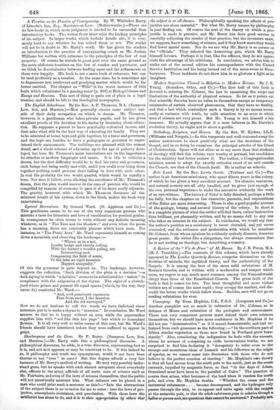Shoeburyness and the Guns. By P. Barry. (Sampson Low, Son,
and Marston.)—Mr. Barry calls this a philosophical discourse. A philosophical discourse, he adds, is a true discourse, representing fact as it is, and not as it appears or may be conceived to be. If this indeed be so, if philosophy and truth are synonymous, would it not have been shorter to say "true" at once ? But this dogma affords a very fair instance of Mr. Barry's method of writing. He may very possibly under- stand guns, but he speaks with such absurd arrogance about everybody else, officers in the army, officials of all sorts, men of science such as Mr. Fairbairn, and even of the laws of science themselves, that the public will not unnaturally mistrust him. What reliance can be placed in a man who could print each a sentence as this?—" Into the abstractions of the subject there is no occasion for me to enter : into the laws of pro- jection, atmospheric resistance, and gravitation. With those laws the artilleriat has alone to do, and it is to their appropriation by others that the subject is at all obscure. Philosophically speaking the effects of pro.. jectiles are alone material." But what Mr. Barry means by philosophy is past 'finding out. Of course the text of the theory on which a pro- jectile is made is practice, and Mr. Barry has done good service in carefully collecting the results of that practice, but the inventors must, we suppose, know something of science, and if they knew more they would find fewer mares' nests. Nor do we see why Mr. Barry is so severe on the "officials:" They selected the Armstrong gun, which Mr. Barry himself favours. Perhaps it is that, like the officers, they do not appre- ciate the advantage of his criticisms. In conclusion, we advise him to strike out of the second edition his correspondence with the 'United Service Institution and his being turned out of the mess-room at Shoe- buryness. Those incidents do not show him in so glorious a light as he imagines.






























 Previous page
Previous page